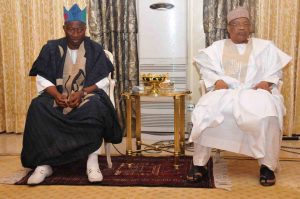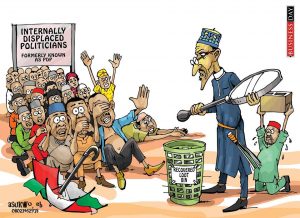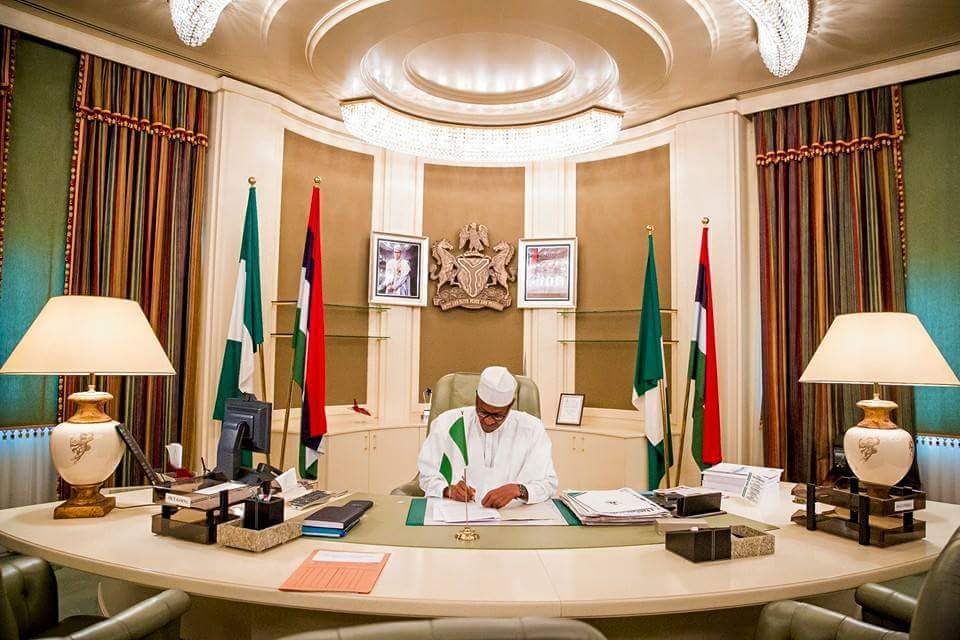In Atiku Abubakar, the Nigerian Establishment has sent a message to President Muhammadu Buhari: we are serious about getting you out in 2019. But it is a message that will be received with utter contempt. The Villa will be utterly disorganised by the message but they will not show it.

Atiku Abubakar and Muhammadu Buhari
That makes the 2019 presidential contest a much more complicated contest than ever before. All two candidates are northerners, all are Muslims, all are utilising the last opportunity to be president of Nigeria, each lays claim to having a magic wand and burning to be given the opportunity to remake Nigeria: Buhari to undo corruption and the corrupt and Atiku to modernise Nigeria. In this complexity, an audit of the Goodluck Jonathan streak in each of Atiku and Buhari is a vital precautionary security move. That is to establish which of them is likely to have learnt from Goodluck Jonathan who lost power but successfully converted defeat to victory in the eyes of the world by saying that his ambition is not worth the blood of any Nigerians. Otherwise, it could be frightening how an incumbent and a candidate of the establishment slugs out a last chance.
Atiku is, of course, the candidate of the establishment. It would be difficult to find anyone who did not see the hands of all the major kingmakers in Nigeria’s national politics at work in Portharcourt at the weekend to make Atiku Abubakar. They were there, one of them physically but the remaining three symbolically. Obasanjo who is still a hard nut to crack will soon cave in when a powerful delegation goes to overwhelm him to Atiku’s side because Atiku is the one out of the two who can be easier managed because he too is aware of the dire consequences of the ‘conquest’ of the establishment by incumbent President Buhari. Above all, Atiku is no longer within the radius of the war against corruption because there will be madness to start bringing any charges of corruption against him or any candidate now after having won his or her party’s nomination. Any such move should have been made before now. As soon as Obasanjo comes in, the entire Nigerian establishment would have unified into a concrete block with Atiku as the unifier. It is this block that will confront the incumbent in 2019, not the Atiku persona as such. This is not to underrate the Atiku persona. It is a formidable factor.
It is built on continuous learning since 1993 to 2015, certainly including a comprehensive analysis of why he came third in 2015. He has lived through the grace and the grass phases of working with Obasanjo, with being fought by people he brought into power and with having to be called a rolling stone – moving from one party to another, the last being the move from the All Progressives Congress, (APC) to the People’s Democratic Party, (PDP). His burning desire to be president did not allow him to give up hope. Rather, he tapped in to his network of allies, points men and associates at each turn to explore any and every angles that appeared to open up the space as far as the ambition was concerned. This has culminated in an astounding victory at the last convention of the PDP even when he had no governors in the party as such. It was the combined effect of a vast network of resource persons whose financial, political and social needs he met over time, a project for which no budget has been too big. The last item in the Atiku persona is how 2019 is his terminal point in terms of contesting for presidential power. At 73 or so, 2019 contest is his last bet. It seems no ideas, resources, friends or connections have been spared in winning the party’s nomination.
Awesome as this political personality might appear, that is not what has brought Atiku closest to being the president of Nigeria. It is the context that has brought him that. By the context is meant the establishment’s disenchantment with Buhari and their sense of urgency in denying him a second term during which he himself has said he would arrest and jail those of them who are corrupt. There could be no more categorical a declaration of intra-class war on a ruling class for which corruption has been the most consistent pastime for its members in the context of primitive accumulation. Why the president could afford such tactlessness is beyond comprehension. It is one major indication that the president must have devised a way of winning outside popular votes because whoever suspects he or she might be going to jail in the event of his second term would work against his victory.

Generational expressions of the Nigerian establishment

Have they got a hitch-free joker for Buhari’s re-election or they were just grandstanding by insisting he must re-contest?
It is that context which has produced two major blocks now who would be confronting each other in 2019. One is the incoherent group around Buhari and the second is the group coalescing around Atiku. In this re-alignment, it is no longer a question of whether Atiku has any moral and ideological drawbacks. It is now a question of what the narratives of Buhari as a nepotistic leader, as someone who fights corruption selectively and an incompetent manager of men and resources have produced. Narratives are not so much about what is true or what is not but about producing intended consequences in the reality they constitute. Some analysts are saying the saving grace is that neither Rabiu Kwankwaso nor a Bukola Saraki has won the PDP nomination. Instead, it is an elderly Atiku who won and who would try to keep his crowd away from violence unlike any of Kwankwaso or Saraki whose supporters might be difficult to control in a place such as Kano.
Seen from the perspective of ruling class alignment rather than just an Atiku enigma, how then do the two dominant candidates stand?
Starting with the parties on whose ticket the candidates are contesting, it can be seen that while the APC is badly bleeding from impositions and counter impositions, exclusions and bad blood that followed the primaries, the PDP is relearning democracy beautifully. It is unimaginable that the PDP Nigeria has seen since late 1999 would suspend its convention for upwards of three hours to undertake a fresh audit of the list of delegates. It was a pleasant surprise in which Yakubu Dogara, the Speaker of the House of Representatives who was the Chairperson of the Accreditation Sub-Committee acquitted himself very well. Something must have leaked about the list to warrant such thoroughness untypical of the PDP. It is probably too early but here might be a Leopard changing its spots.
Closely tied to that is where there was neither imposition nor pressure on anybody to withdraw in the name of family understanding which has also been typical of the PDP. All 12 aspirants campaigned and went to the contest. The ability to manage such an unwieldy collection of big names without anyone grumbling loudly or storming out or threatening court action means a calmer and coherent PDP than the APC house at the moment. It doesn’t matter whether the fear of Buhari is teaching them all better organisational behaviour, all these signs are worth taking note of.
The second point is what the campaigns could bring out, especially now that it would be too glaring to use the instrument of EFCC against anyone who has already won his party’s nomination. The electioneering campaign is the only opportunity left for each party to undo the opponent. If previous experiences are anything to go by, it would be all about exposing each other’s past to the point of overshadowing substantive issues of development strategy, development financing, fighting corruption, checking waste, state building and nation building. In the past, the focus was on exposing how sectional and religiously bigoted Buhari is supposed to be. Now, how corrupt Atiku is supposed to be would come in. It would rarely be about proof of these claims but the storylines. If not carefully handled, this can damage each of the candidates to the point of a stalemate in the election. The hope is that the Abdulsalami/Kukah Peace effort as well as the work of anti-hate speech campaigners would moderate or keep the campaigns on substance.
The third comparison/contrast is the disposition of each of the candidates to the members of the ruling class. While Buhari sees most of them as corrupt and worthy of punishment, Atiku sees in them fellow politicians, fellow compatriots and mature men who do not need a task master with a cane in hand. This is real but there is no reality beyond the narratives of it. As such, the media image of Buhari is that of the selective disciplinarian while that of Atiku is that of someone who doesn’t give a damn about corruption or someone who might even pardon those already convicted. Each of the perceptions will harm as well as heal each of Buhari and Atiku in the coming election, depending on which quarter.

Buhari and UK’s Theresa May

President Buhari and President Trump who told his guest point blank to go and stop the killing of Christians without Buhari countering
The fourth contrast/comparison is the global context of the contest. The nature of the forces working for Atiku at the moment favours Atiku in terms of who the global power configuration is more disposed to. The only problem is if Obasanjo, for example, is not drawn into the Atiku fold and if he should choose to campaign against Atiku’s candidacy, citing whatever reasons. Obasanjo’s global network as far as creating such a setback is intact. The problem for him is if he doesn’t accept Atiku and he is not with Buhari, who has he got that Nigerian would prefer to any of these two at the moment?
Fifth point to consider is the incumbency factor. Can Atiku become a bandwagon as to overwhelm Buhari? That is the only way his presidency can materialise because there would simply be a repeat of Osun should he be running neck-to-neck with Buhari.
Sixth point is the reverse framing of the incumbency advantage. That is, can an incumbent be so powerful as to defeat the candidate of an elite consensus as Atiku now is? It would be interesting to watch that play out because, aside from several other centres of power, most if not all the presidential aspirants Atiku prevailed over are bound to campaign for him because they know the implication of the other candidate winning. And it is a long and powerful list here, beginning from incumbent Senate President, Bukola Saraki; his predecessor, David Mark; Senator Rabiu Musa Kwankwaso – governor for eight years, Minister of Defence and a Senator; Governor Aminu Tambuwal – former Speaker with some level of iconicity; his multi-talented Gombe State counterpart, Ibrahim Dankwambo who is though not under any probe in public knowledge yet; Ahmed Makarfi who has reputation of innovative management of diversity when he was governor of Kaduna State; Sule Lamido with his PRP pedigree and status of a former Minister of Foreign Affairs; two veterans in Attahiru Bafarawa and Jonah Jang and two younger members of the establishment: Kabiru Tanimu and Dr. Datti Ahmed who is additionally associated with generating ideas as the mastermind behind a thriving capital city university. Each and every of this personages would count in the process.
Seventh, how does each of the candidates walk out of their main baggage? Buhari has three main baggage: nepotistic composition of government, being unable to respond to widespread killings by herdsmen and ‘herdsmen’ and supervising a selective conduct of the anti-corruption campaign. Atiku has the image of someone who is not bothered by corruption, who is captive of the transient populism of restructuring even when nobody has such a clear idea of what restructuring means beyond the problematic notion of re-regionalising Nigeria and, thirdly, his problematic infatuation with privatisation which he has now included the Octopus called the Nigerian National Petroleum Corporation, (NNPC). It is not clear if he has thought out the question of who is rich enough to buy it or is he contemplating a non-Nigerian? Or is he thinking of unbundling NNPC and selling them as scraps only for the government to turn round to be funding the scraps for the so-called private buyers? It would seem that he has forgotten how this was defeated in the National Assembly in 2016 not necessarily by radicals but by voices such as those of George Akume, Ike Ekweremadu, Shehu Sani and so on. Or, is he thinking the nationalist constellation has evaporated? In the case of restructuring, how does he accomplish it in a multi-party democracy in which the other parties are not too clear on the issue?

 Eighth point to consider is this! Both are products of paradoxical sentiments: Buhari cried for Nigeria but only to run Nigeria in a way that is not out rightly rated in approving terms after a stunning electoral victory in 2015. Atiku has alleged elite conspiracy to shut him out of power but only to be given a stunning approval at a well organised convention of the nation’s political party with the highest concentration of the elite. Would the paradox enhance or play against each of them?
Eighth point to consider is this! Both are products of paradoxical sentiments: Buhari cried for Nigeria but only to run Nigeria in a way that is not out rightly rated in approving terms after a stunning electoral victory in 2015. Atiku has alleged elite conspiracy to shut him out of power but only to be given a stunning approval at a well organised convention of the nation’s political party with the highest concentration of the elite. Would the paradox enhance or play against each of them?
The ninth and the last factor is the stakeholders’ factor. Each of the two candidates have stakeholders. Although Buhari is not that generous as a leader, several layers of beneficiaries have emerged in the last four years, from journalists to political appointees to cabals, heard of as well as those unheard of and so on. They have a stake in his re-election. If the presidential election holds first in the sequence and Buhari does not win out rightly, there are many governors who will not be re-elected. Unless they reverse the election sequence so that governorship election precedes the presidential election, such stakeholders will make Buhari’s re-election a do or die affair. The problem they will have is if the PDP should change gear in favour of the existing order of elections, perhaps because they see they now have a candidate with the capacity to de-campaign the incumbent and defeat him.
The stakeholders’ factor on Atiku’s side is heavier. Apart from the hundreds of academics, journalists, bankers, public relations experts, swingers, speculators and sundry experts, there are the numerous players who are stranded in the polity generally and in the party who would have to be re-located in the web of power. While there are those who may would not need anything beyond an atmosphere in which they are free from EFCC harassment, there are others who would need an appointment. All of these interests and forces would be interested in an Atiku victory just as their counterparts in the Buhari camp would be interested in Buhari victory. It is just the nature of our politics today.
Whether the Abdulsalami/Kukah kitchen, joined by the monitors of dangerous speech can prepare political herbs that can keep the contest within the boundaries of a decent campaign would be an interesting dimension to the unfolding story of 2019.





























1 Comments
Pingback: 2019 General Election: Atiku the Candidate of the Nigerian Establishment (Pt 1) - Maroonsquare